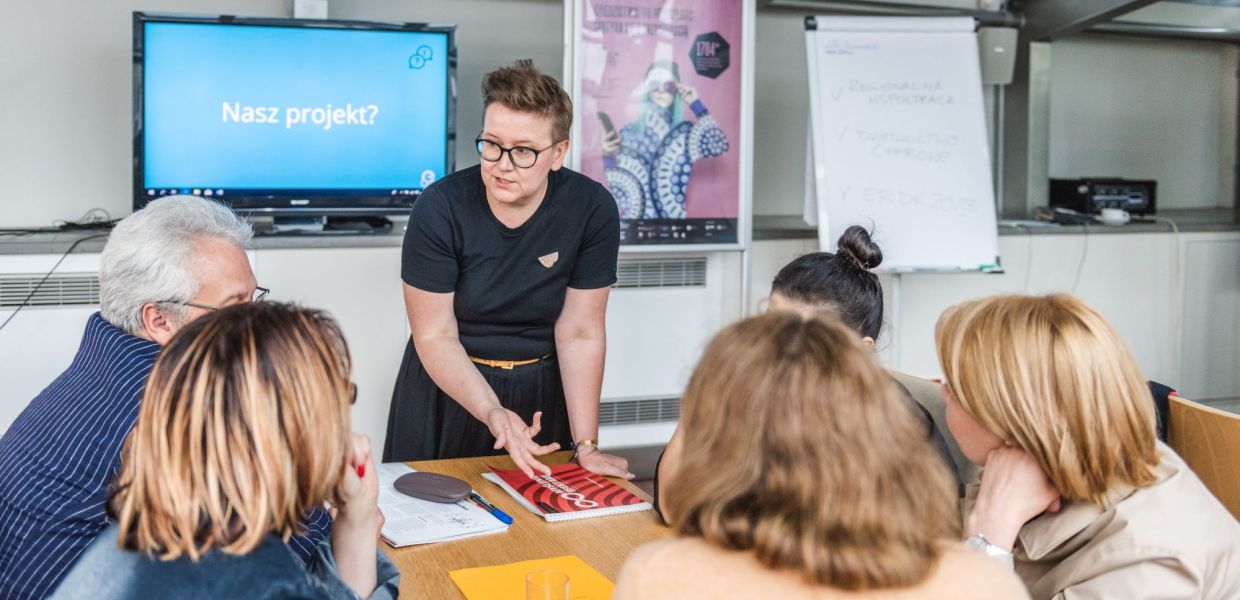Running workshops and translating impact in Poland - a user perspective
Since we launched the first phase of the Impact Playbook, we’ve been delighted to see how many different institutions around the globe have been using it, testing it and holding their own impact workshops. We hear from Maja Drabczyk, Chief International Projects Expert at the National Film Archive - Audiovisual Institute Poland on her work running impact workshops in Poland.

- Title:
- TuEuropeana workshop: Myślenie Efektami
- Creator:
- Klaudyna Schubert
- Date:
- 2018
- Country:
- Poland
- Copyright:
- CC BY-SA
I was first introduced to the Impact Playbook in the fall of 2017 in Tallinn, during one of the workshops run by Europeana. The meeting was kicked off by a truly inspirational presentation from Professor Pier Luigi Sacco on Culture 3.0. and the impact cultural participation and cultural heritage has on our creativity, our welfare, and our lives.
Up until that point, when I needed to report back about the results of my work and the projects I ran, I mostly had to stick to page views and other quantitative statistics. I was missing a qualitative approach to reporting. The Playbook seemed to be offering this different tactic. Therefore I decided to learn more about the methodology and the set of tools and solutions the Playbook offers and became an Impact Task Force member. I decided I wanted to have it tested back home and to verify whether the approach could also work on the Polish GLAM scene.
What we’ve been doing in Poland
For the past three years, together with Marcin Werla, from the Poznań Supercomputing and Networking Center (PSNC), I’ve been co-ordinating TuEuropeana - a project inviting potential users and institutions with digital archival collections to exchange knowledge and experiences. Our aim is to raise awareness of online repositories, including Europeana Collections, and promote free access and reuse of digital archival content. This year, among other things, we decided to focus on GLAM institutions operating on a local and regional level. Over the course of 2018, we are running four seminars for GLAM experts from different parts of Poland during which we are discussing strategies, challenges and opportunities linked to providing free access to and reuse of digital heritage in a local but also in an international context. We are halfway done with two workshops already behind us and with two more to come in the fall.
From my experience of running these workshops I can say that the Playbook helps structure group discussion, especially if the focus of the discussion is on stakeholders, strategy, workflow, and finally also impact. It puts the necessary questions in a certain order, at the same time leaving room for a flexible discussion. It supports the project- and process-based approach. I believe that this holistic approach, placing the stakeholders in its centre, could be of much use to colleagues in Poland. And I do hope that the Impact Playbook will play a part in changing our status quo.
Translating impact
We’ve translated the Playbook into Polish. The translation was a necessary measure if we wanted to have any chance of testing the Playbook with the Polish GLAM community. It took us two weeks to have the Playbook translated and another week or two to have the text integrated with the original layout.
It turned out good translation is key as words can be tricky. For instance, in the Polish language we do not have a direct translation of the word ’impact’ which slightly complicates the whole discussion on the phenomenon of… impact. We needed to refer to synonyms, to create a clear definition of the word. I believe we succeeded and the workshops have helped prove that the instructions and descriptions in the Polish version of the Playbook called ‘Myślenie Efektami’ are intelligible.
Benefits, recommendations and what the future holds in store
One of the biggest added values of having the Playbook integrated in the seminar’s programme so far is the fact that it enables human interaction. The exercises as well as the encouragement of opinion-sharing and discussion support the group process. In my opinion the Playbook works best when it is in the hands of a set of experts with various knowledge and skills. This highlights how relevant the initial preparatory, pre-workshop phase is: I recommend you think carefully about who to involve.
At our first workshop in Kraków, during which we used the Playbook to plan an imaginary regional case study promoting access to digital archives, I saw people from the same city but different GLAM institutions passionately discussing aspects of their work which were unknown to their counterparts… At the end, they were exchanging business cards, planning to continue to work together in the near future. I want to believe that our one-day workshop helped them identify the potential there is in their community and how much can be achieved by joint effort.
We still have two more workshops to run this year. Still plenty to learn and some things to improve. For this reason, I am also very much looking forward to my work to come in the Impact Task Force on the parts of the Playbook that still need to be developed. Sometime soon I would also like to run my own impact assessment on one of my projects at FINA. It’s brilliant how easily adaptable the Playbook is.
If you are interested in planning and running your own impact workshop, download our Impact Playbook for a step-by-step guide. If you’d like to help translate the Playbook into your language, get in touch.

